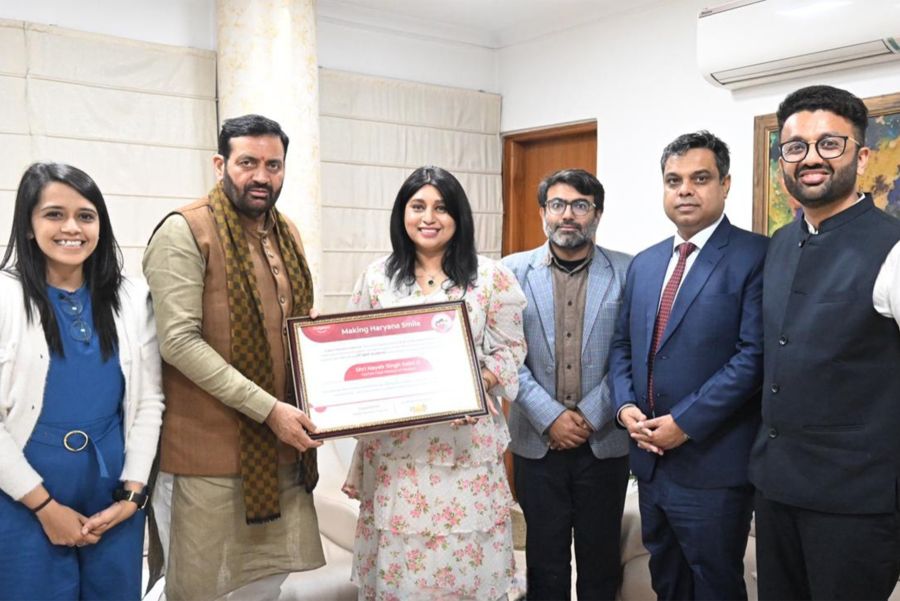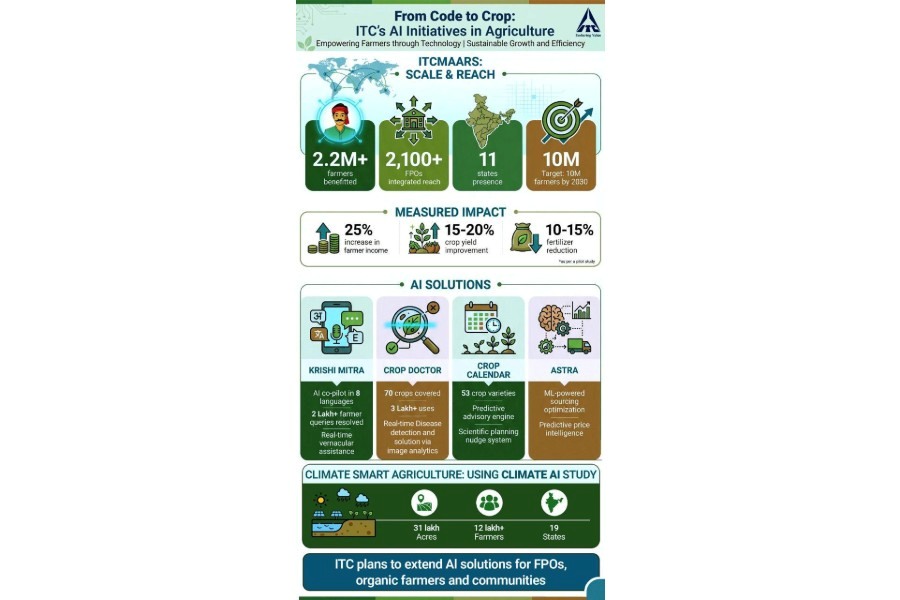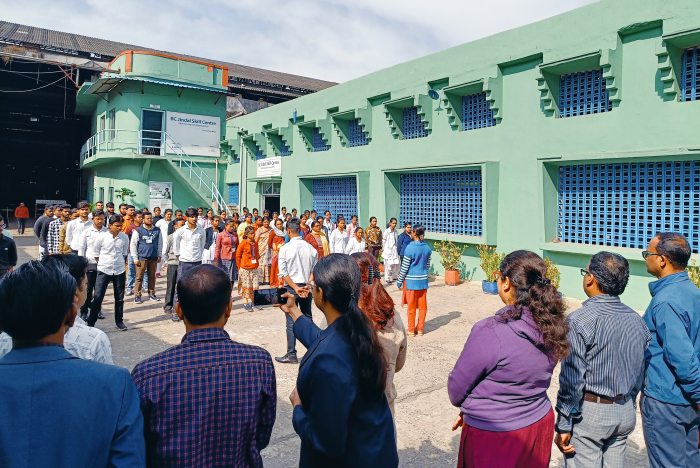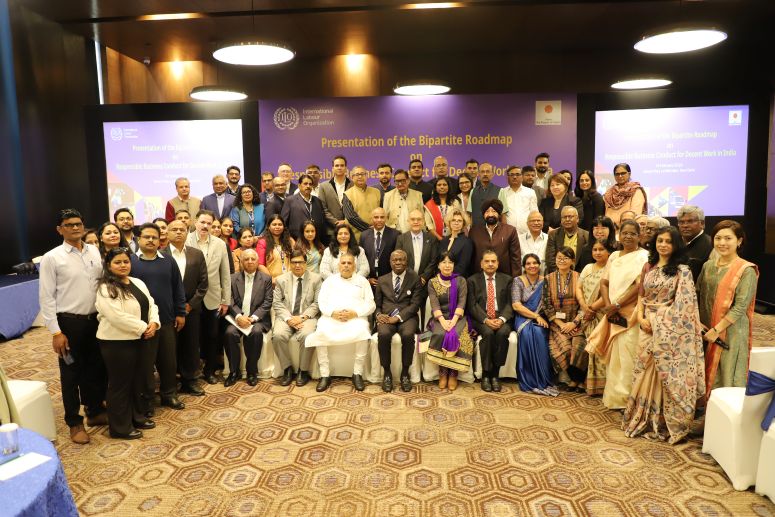New Delhi, Jun 13, 2025: In a pioneering move, multi-business conglomerate ITC Limited has become one of the first Indian FMCG companies to release a comprehensive ‘Nature Report’, aligning with the Taskforce on Nature-related Financial Disclosures (TNFD).
Founded by a coalition of organisations including the United Nations Development Programme (UNDP), the UN Environment Programme Finance Initiative (UNEPFI), Global Canopy and the World Wide Fund for Nature (WWF), TNFD is a market-led, science-based and Government-backed global initiative that provides a framework for organisations to report on their nature-related dependencies, impacts, risks and opportunities.
ITC has adopted a Sustainability 2.0 agenda that reimagines sustainability under the pressing challenges of climate change and livelihoods. This agenda champions inclusive models that foster sustainable livelihoods, accelerate the transition to a net-zero economy, ensure water security, drive circularity, and protect biodiversity through nature-based solutions. At the heart of this approach is ITC’s philosophy of ‘Responsible Competitiveness’—a distinctive framework that integrates sharp business acumen with environmental and social responsibilities.
S Sivakumar, Group Head – Agri and IT Businesses and Sustainability, ITC Ltd, said, “ITC’s sustainability journey of over two decades is rooted in the belief that competitiveness and sustainability are not mutually exclusive. Through our first Nature Report, we are reinforcing our strategy of Responsible Competitiveness—which embeds nature-positive actions into our business models while creating sustainable livelihoods and restoring ecosystems. Our large-scale and impactful efforts in afforestation, water stewardship, and biodiversity conservation have already made significant contributions towards safeguarding natural capital. Going forward, our differentiated approach towards nature would continue to focus on replenishing the environment, while supporting resilient communities that depend on nature for their well-being.”
The urgency of addressing nature and biodiversity loss today cannot be overstated. The World Economic Forum’s (WEF) Global Risks Report consistently highlights biodiversity loss as a major global risk. In this context, ITC’s first Nature Report affirms its conviction that nature is not merely a resource but a foundational enabler of business resilience and stakeholder well-being. Biodiversity delivers essential ecosystem services—ranging from water security and raw material availability to soil fertility, climate regulation, and pollination—all vital to nature-dependent businesses. At the same time, ITC is committed to reduce any direct and indirect impacts of its operations and value chains on nature. This dual lens of dependencies and impacts has led ITC to adopt the TNFD’s LEAP (Locate, Evaluate, Assess, Prepare) approach, integrating nature-related risks and opportunities into its strategy.
A distinguishing aspect of ITC’s biodiversity approach is its strong emphasis on sustainable livelihoods. The Company’s collaborative initiatives go beyond ecological restoration to empower rural communities through nature-positive economic activities. These include regenerative agriculture, afforestation, watershed management, and waste circularity, all designed to create income opportunities while restoring natural ecosystems. This community-focused strategy exemplifies how biodiversity conservation can drive inclusive development.
The Nature Report consolidates ITC’s science-based, sector-specific strategies across its Agri, Foods, and Paperboards businesses, which interface closely with natural ecosystems. Some examples of ITC’s impactful initiatives from the report include the Company’s Climate Smart Agriculture programme spans 2.79 million acres and has impacted over 1.05 million farmers across 19 states. This includes zero tillage method of wheat farming, Direct Seeding of rice, micro-irrigation in chilli and Broad Bed Furrow method for Soya cultivation to reduce emissions and conserve water. Among other benefits, ITC’s regenerative farming initiative also helps in the decarbonisation of agriculture by rebuilding soil organic matter and restoring degraded soil biodiversity, resulting in both carbon sequestration and improving the water cycle. The Company’s Agri Business Division has also secured organic certification for sourcing crops like Wheat, Chilli, Turmeric, Mango and Rain Forest Alliance (RFA) certification in Coffee, Chilli and Turmeric.
In its Paperboards and Specialty Paper Business, ITC has promoted sustainable forestry with over 149,000 acres of plantations under FSC®-Forest Management certification, benefiting over 25,000 farmers and ensuring deforestation-free pulpwood value chains. The Company’s Paperboards and Packaging Businesses have also developed biodegradable, recyclable packaging innovations that replace single-use plastic. This has been done for a range of industries as well as ITC’s own FMCG brands. ITC’s Foods Business has made significant strides in the area of reduction of food waste and promotion of renewable energy, sustainable packaging, and water risk management. The Company’s foods factory in Malur has become the first foods processing facility in Asia to achieve AWS Platinum level certification through robust rainwater harvesting systems. With ITC’s initiative, four river basins have already turned water positive, and work has commenced on the 5th river basin.
Among its new initiatives, the Nature Report features the development of the Sarapaka Biodiversity Conservation Plot over 440 hectares of reserve forest near its Bhadrachalam paper unit in Telangana. In coastal Andhra Pradesh, the Company is also piloting mangrove regeneration on 500 acres to boost carbon sequestration and protect against tidal surges.
The report also outlines ITC’s ambitious 2030 Sustainability goals pertaining to nature, which include covering 1 million acres under biodiversity conservation, bringing 4 million acres under Climate Smart Agriculture, creating 60 million kilolitres of water storage capacity, and maintaining plastic neutrality, among others.
Through its Nature Report, ITC presents an enabling model for future-proofing growth – one that integrates biodiversity conservation, climate resilience, and livelihood creation into the fabric of corporate purpose.





















.jpg)



